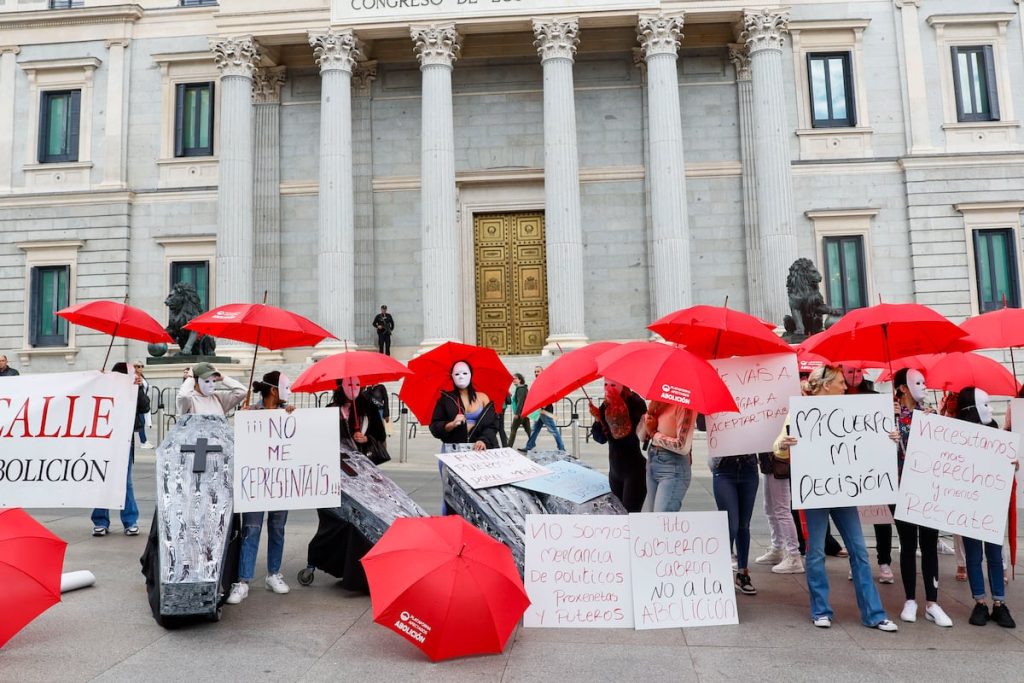The PSOE and several of its usual partners in Congress, such as Sumar, Podemos, EH Bildu, Compromís, and ERC, coincide in assuming that this is another key moment in the legislature, but differ somewhat on what course to follow. It is an ideological and principled debate, but also an electoral one in the lead-up to the June 9th elections, reflected in the laws being debated and approved on the eve of another campaign, the European one, which begins on Friday. The PSOE believes that it is time for “everyone to show their true colors” and has wanted to include in this week’s session, after several weeks of parliamentary standstill, two very symbolic projects for the left: the prohibition of procuring (an initiative promoted by the PSOE alone) and the reform of the Land Law (approved by the Council of Ministers). Faced with the distancing of their allies, who see these proposals as electoral haste, the Socialists have entrusted the success of these initiatives to the abstention of the PP at a time of great national political confrontation over the Milei and Begoña Gómez case. For now, the proposal against procuring has already been discarded on Tuesday.
The PSOE, like all parties, has a series of quotas to include in the agendas of parliamentary debates the projects that interest them the most, according to their parliamentary representation and the Congress calendar. After several weeks of parliamentary impasse due to electoral campaigns, the socialists had three bills prepared and chose two of them to be put on the agenda of Congress a few hours before the start of the European campaign: amending the 1995 Penal Code to prohibit procuring and changing the Land Law. The socialist group had another finished law to recognize prison officers as law enforcement agents, but postponed that rule until next week. Nothing is coincidental in politics.
The spokesperson for the PSOE in the lower house, Patxi López, tried on Tuesday to justify the agenda of these controversial issues among partners on logistical grounds, arguing that the proposed laws are already the most elaborate, but ended up admitting that they also intended to take a stance and have Congress “show its true colors” on debates of “principles” and “left-wing” positions, conceding that “sometimes you have to propose initiatives even though you know they will be lost.” López had no qualms about whether these proposals would be rejected due to these differences or if they would succeed with the temporary alliance of the PP, even if it was just through abstention.
In the PP, they reveled in playing with their unexpected determining position in both cases. The PP spokesperson, Miguel Tellado, delayed as much as possible on Tuesday in announcing the PP’s vote on the two projects to highlight a new division within the Government and with their partners. Two years ago, the PP supported a similar proposal from the PSOE, which was then put on hold due to electoral processes. Now they are trying “not to help” the Government in any way, but also positioning themselves as an “alternative party of the State”. Ultimately, they opted for a vote against, despite contradicting their position in the previous legislature.
The socialists maintain that both the law that punishes prostitution and the one that seeks to regulate land urbanization, as demanded by the municipalities and the Federation of Municipalities and Provinces to be voted on this Thursday, are left-wing laws even if they are sponsored solely by the PSOE, in contrast to the rejection in both cases by Sumar, Podemos, EH Bildu, Compromís, and other formations. The PNV also does not support the law on procuring and is negotiating amendments to support the land law. It is particularly significant that the Sumar group is distancing itself from this latter bill, for which the coalition government sent a formal observation to Congress on the content of the norm of the minority partner. Sumar has already stated that they will not stop the total rejection amendments registered by Podemos, ERC, and Junts on Thursday. The PP is keeping their voting intentions secret.


